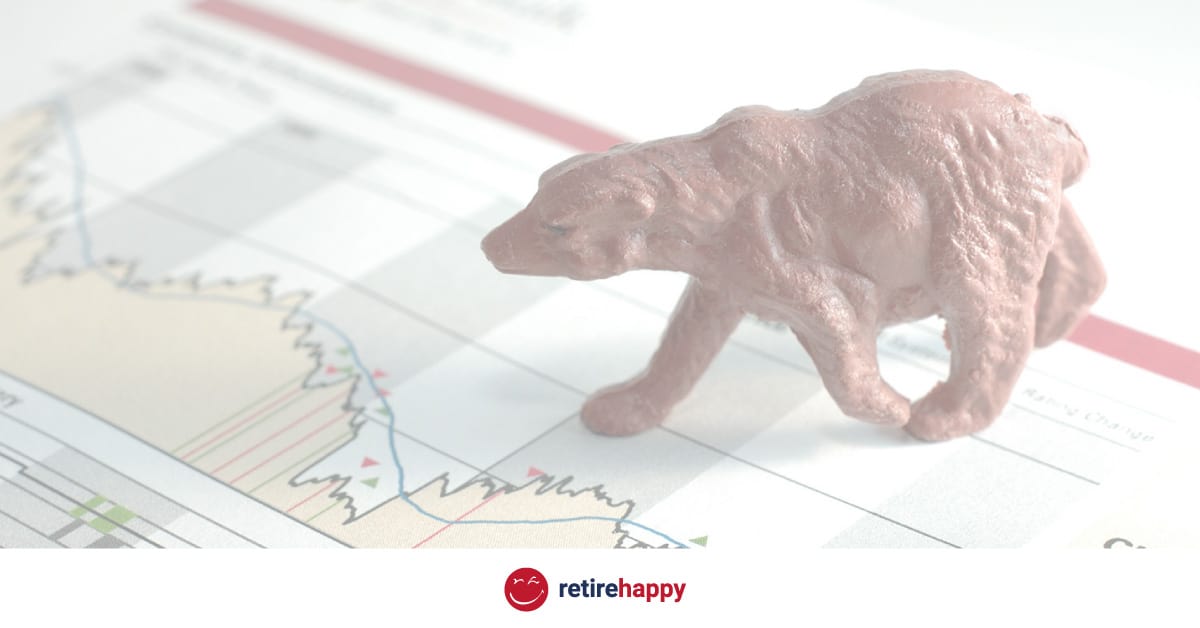What is a Bear Market and can you see them coming?

A Bear market is a normal part of a stock market cycle, but what exactly defines a bear market? To understand a bear market better, it’s helpful to understand three terms:
- Stock market correction. A correction is generally accepted when the stock market drops more than 10% but less than 20%. Market corrections generally occur for short periods of time.
- Bear markets occur when the market drops more than 20% into what is known as bear market territory. Unlike stock market corrections, bear markets are sustained.
- A Bull market is the opposite of a bear market, where the market goes up or appreciates 20% or more from a low. Bull markets follow bear markets and typically last longer while reaching new highs.
Can you predict when a bear market is coming?
It is much easier to recognize a bear market after it has arrived. The harder task is to recognize it in advance – it’s simply too difficult to predict the future. More importantly, no one can perfectly time the transitions between bull and bear markets (and vice versa). We may wish that ability existed in the investment industry, but it does not.
It’s far easier to analyze the past. Hindsight may be perfect, but it tells us little about the future. Staying informed through newspapers or television can help, but most of the information we consume summarizes past events. Be very careful about how you apply old news to the future.
When it comes to future stock prices, even the experts can’t agree. There will always be those who believe a new bull market is on the horizon, that bear territory looms around the corner, bears, and everything in between. Rarely is there consensus.
Unfortunately, predicting the future with accuracy and consistency is impossible. The markets are a sum of buyers and sellers and several varying opinions. When you think you’ve got the market figured out, it changes, and the rules change. This is precisely why many experts feel market timing is so foolish and cannot be done with any degree of accuracy.
Related article: Three P’s of investing
Bear Market Odds
What are the odds of market drops? A slowing economy will experience drops in different magnitudes and frequencies, but here are some benchmarks to consider:
- Drops of 5% or more occur every year and multiple times per year
- Drops of 10% or more occur every couple of years
- Drops of 20% or more occur once every 4 to 7 years.
- Drops of 30% or more occur every 7 to 12 years.
Firstly, markets will always rise and fall in the short term. Although we’d love the stock index to continually rise, that’s not the reality with investment prices. In time, we will all experience a weak or slowing economy. Bigger drops like bear markets and crashes are also normal but, thankfully, less frequent.
If you are patient, you will see that the market recovers. We never know exactly when, but they will reach their previous highs and go higher. Take comfort in history – the stock market has crashed several times before – at the outset of The Great Depression in 1929, 1973-74, 1987, 2001, 2008, 2020, and now in 2022. Each time it has regained strength and gone on to new highs.
Related article: Historical stock market data
Good news ahead?
So what about our current situation of historic high inflation and sharp increases in interest rates? At the risk of sounding optimistic, I believe there is room for some positive commentary instead of all the widespread pessimism in the media about the current economy and market conditions.
Here are some thoughts on why every bear market creates incredible buying opportunities:
- There is always sunshine after the rain.
- Markets go up three to four times more often than markets go down.
- Bear markets are essential to economic health (believe it or not).
- Bear markets put stocks back into the hands of their rightful owners.
- In tough times, I remind myself daily of a line from one of the greatest investors of all time. Sir John Templeton said, “you should always sell at the height of optimism and buy at the height of pessimism.”
In the end, the lesson is simple – past performance is no indicator of future returns. In other worse, don’t try to time stock markets, and be patient because the sun will shine again.
How to respond to a bear market?
As discussed, falling stock prices are inevitable from time to time. History has shown that bear markets tend to occur once every 3 to 4 years and last for about one year (289 days to 388 days).
Seeing a bear does not always mean you are in danger. Sometimes, the worst thing you can do is panic. If you do, you might make ill-considered moves that could cost you. Financial markets are cruel to those who sell during a weak or slowing economy. Remember that losses are only “on paper” unless you sell! Have an investment strategy and think with your head (logic), not your heart (emotion)! When it comes to Grizzly Bears, many say you are supposed to play dead and do nothing. Fighting back can be a very dangerous move.
At the zoo, they tell you not to feed the bears. In investing, it is quite the opposite. Investing when share prices are low buys you more shares. One of the best strategies to feed the bear is Dollar Cost Averaging. Dollar Cost Averaging consists of investing a fixed amount at regular intervals, which reduces your average cost over time. By adding to your holdings amid a Bear Market, you increase the number of shares you hold. The more shares you hold, the more you stand to gain when the market rebounds.
Related article: The power of dollar cost averaging
Sooner or later, all bears go back into hibernation. You’ve often heard financial experts preach the merits of long-term investing. When stock markets drop, experts will advise you to hang in and remember that it’s just a matter of ‘time’ before markets go back up. In my opinion, it has less to do with time and more to do with patience. You can have time and no patience. In my opinion, everyone has more time than they think. In times of distress, what gets tested is patience. Good things come to those who wait. My father taught me that a long time ago; it is a good lesson to keep in perspective today.
Seek help from experts. If you find it difficult to cope with these prolonged price declines, speak to a Financial Advisor. Often Financial Advisors can put things into perspective. Most advisors have been through times like this before. My advice is because these times can be so emotional, try to talk to more than one advisor. The experts know how to deal with bears better than the amateurs do.
Do bear markets mean you should sell?
While your heart may feel like it’s time to sell in a bear market, here are five problems with selling when a bear market occurs.
The first problem is that you are selling at a very low point in history. Logically, there is a high probability of an upside in the next few years following a bear market. History has shown this over and over again.
Related article: Buy low, sell high
If you are getting out permanently because you cannot stomach the risk, the problem is you do not have much in the way of alternatives. GICs and bonds are safer, but they won’t recover the same way the stock market will recover in the future. Selling realizes your paper losses but guarantees a long road to recover those losses. If you lose 10% of your funds’ value and then re-invest the funds at 2%, it will take you over five years to get back your original investment. At 5%, it will take over two years to make up for the loss. The best way to compensate for those losses is to stay invested or buy more to lower your average cost.
If you are just selling temporarily to wait for a better investment time, you are trying to time the market. The problem is that you cannot time the overall market consistently. A study by the Financial Research Corporation showed that there is a trend for investors to trade more frequently than practice a buy-and-hold strategy. In 2000 the average holding period for a mutual fund was 2.9 years. In 1996, the average holding period was 5.5 years. This study showed that these same investors tended to chase performance, choosing investments based on recent highs. There was 14 times more money going into the ‘best’ performing investments over the ‘worst’ performing investments. Yet, these same investors made 20% less money chasing hot funds than staying put.
Selling when the market is at its lowest point is an emotional reaction. There are many emotions out there, and negative ones dominate the investment industry. All you have to do is listen to the news, read the paper or check your investment statement to understand why. The unfortunate part of decisions based on emotion is that it causes investors to do the wrong things at the wrong time. We buy when we should sell and we sell when we should buy.
My two cents on Bear Markets
Despite the negative investor sentiment and concerns over a potential recession, war, or a prolonged market downturn, I think there are many reasons to suggest better times ahead. While I do not know what the next days, weeks, or months will bring us, my general outlook for the next few years is positive.
Selling today may help you to sleep at night and work in the short term but given time, you will find that you are better off staying invested. Good luck!

Comments
As I rapidly approach my 70’s in today’s’ market (Dec 2022), I am patient enough to hold on and not do anything rash. My expectation is that within a few years we will be moving into a Bear market. However, my residual income, savings, RRSPs and some stocks see me, at this moment, fairly secure and in a comfortable place. What does have me a little concerned is the fact that when (?) the Bull market returns, all well and good, but my age would then be starting to work against me – and the long term. Life will not go on forever and my issue is that as a Bull market returns, I am that much older and not sure if I could withstand another (potential) return of a Bear market down the road. Given my earlier statement of being relatively stable (and not shooting for the financial stars!), would it be in my interests, at the point of a solid Bull market, to move to something like GIC’s?
Excellent advice!
I have often sold into a bear market, with poor results! I have learned and practiced to buy when money is available and stay fully invested. If Warren Buffett can’t time the market, what makes anyone think they can? Well I can’t, so I don’t even try. Working out much better for me!
You have a terrific blog, keep it up!
Thanks Jim. Much appreciated your positive outlook.